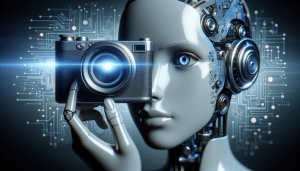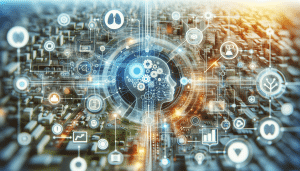AI Trends That Could Change Your World in 2025
Oliver Cooper August 25, 2025
Artificial intelligence is set to shape daily life in remarkable ways by 2025. This guide explores the anticipated AI breakthroughs, ethical considerations, and evolving roles for technology across society, keeping you informed on trends poised to impact everything from healthcare to communication.
Understanding the Growth of Artificial Intelligence in 2025
The pace of artificial intelligence development accelerated rapidly. By 2025, AI systems are predicted to perform more complex tasks, from processing vast amounts of data to understanding human language nuances. Enhanced machine learning algorithms lead the way, fostering smarter and more adaptive AI applications that evolve through self-training techniques. In industries such as healthcare, automotive, and finance, AI continues to unlock new efficiencies and enable groundbreaking solutions that seemed out of reach a few years ago.
AI isn’t just reshaping business; it’s influencing how people interact with technology. Smart assistants, recommendation engines, and image-recognition tools integrate seamlessly into daily routines, making tasks easier and often more personalized. Data from 2025 shows that these advancements rely heavily on large, well-labeled datasets, fueling the next generation of deep learning models. As a result, pathways for future development become even more data-driven, with organizations prioritizing ethical data collection and transparency.
As artificial intelligence becomes more embedded in society, conversations focus on responsible implementation. Many tech leaders discuss the balance between innovation and ethical use, aiming to ensure AI empowers rather than replaces human decision-making. This dual emphasis—on both technological progress and ethical oversight—creates fertile ground for societal adaption, education, and trust-building within the AI ecosystem. The future of AI in 2025 promises collaborative progress, with technology working alongside people rather than in isolation.
Major AI Applications Transforming Industries in 2025
Several key sectors stand out for their high-impact AI deployments in 2025. In healthcare, deep learning models analyze patient data to support diagnosis and treatment planning, addressing complexities beyond the capacity of traditional software. Natural language processing helps decode unstructured medical notes, while predictive analytics anticipate illness risks before symptoms appear. These capabilities do not replace clinicians but support better outcomes and faster insights (Source: https://www.nih.gov).
Manufacturing and logistics harness AI-powered robotics for enhanced automation and supply chain management. Smart sensors and computer vision technologies ensure quality inspection and predictive maintenance occur in real time, minimizing downtime and optimizing productivity. In the automotive industry, driver-assist technology powered by machine vision and sensor fusion builds on advancements in autonomous systems, driving stewardship for safety (Source: https://www.nhtsa.gov).
Financial services also benefit dramatically from AI in 2025. Sophisticated fraud detection engines and algorithmic trading optimize security and investment performance. Customer support chatbots—now utilizing conversational AI—handle routine requests and free up human agents for complex cases, improving overall service quality. Continuous learning ensures these systems remain current and adapt to shifts in fraud behavior and consumer needs (Source: https://www.cfainstitute.org).
Ethical AI and Responsible Innovation in 2025
Growing reliance on artificial intelligence invites important questions on ethics and responsibility. In 2025, public and private organizations develop codes of conduct to govern AI practices. Transparency is a key focus: ensuring both users and developers can understand how algorithms make decisions. Initiatives to minimize algorithmic bias and encourage fairness are prioritized, building trust in AI-powered outcomes (Source: https://aiethicslab.com).
AI-driven automation sparks debate around workforce transformation. Some roles change while others evolve, requiring upskilling rather than large-scale replacement. Education systems respond by updating curriculums with machine learning and data literacy components. Empowering individuals with technical understanding positions them to navigate the new landscape more confidently, helping society adjust to rapid technological evolution.
As AI systems impact everything from legal decisions to financial approvals, accountability for outcomes becomes crucial. Explainable AI solutions aim to clarify algorithmic reasoning, allowing humans to oversee critical decisions. Ongoing research into fairness, privacy, and human-centric design demonstrates that responsible progress—and continued scrutiny—is as significant as technical achievement in the AI future unfolding in 2025.
AI in Everyday Life: Smart Devices and Personalized Experiences
Homes and cities embrace AI technology for smoother, more tailored experiences by 2025. Smart thermostats, voice assistants, and connected vehicles learn individual behavior, adjusting settings to optimize comfort, safety, and convenience. Personalized recommendations—in news, entertainment, and shopping—are powered by AI models, making digital environments feel more responsive to unique preferences.
Mobile devices expand beyond communication tools. AI-driven health monitoring apps track activity levels, detect patterns, and provide reminders for better wellness management. Smart sensors embedded in urban infrastructure coordinate traffic, manage energy, and detect maintenance issues. Such integrations facilitate efficient, seamless living, driving forward the vision of responsive smart cities (Source: https://www.smartcitiesworld.net).
AI-fueled content creation broadens access to media and information. Generative models craft tailored articles, music, and visual art, supporting creativity while raising questions about content integrity and authorship. Despite challenges, these innovations showcase AI’s expanding creative and organizational reach, enriching daily experiences and fostering discovery in personal and professional contexts alike.
The Future Workforce: Preparing for AI Integration in 2025
Workplaces transform through deeper AI integration, creating shifts in required skills and job roles. Adaptability, creative thinking, and analytical expertise are in demand as routine processes become automated. Forward-thinking organizations sponsor upskilling programs, exposing employees to coding, data management, and ethical technology principles. This collaborative training environment prepares teams for ongoing adaptation as AI continues to evolve.
Remote work solutions benefit from AI enhancements, with virtual collaboration platforms employing sentiment analysis and automatic scheduling to streamline productivity. Chatbots and AI-driven knowledge bases enable quick issue resolution, reducing friction for distributed teams. Machine translation tools support global collaboration, bridging language barriers and extending workforce diversity. Leaders emphasize fostering a culture that can pivot with technological changes, focusing on long-term resilience.
Educational resources, both online and in-person, expand to reflect AI’s growing relevance. Free and low-cost online courses from accredited organizations present new pathways for professional growth and literacy in artificial intelligence. Some providers guide learners through structured programs on ethics, programming, and data science, building skills essential for tomorrow’s work. This educational shift ensures the workforce of 2025 is ready to participate in and help shape future technological landscapes (Source: https://www.coursera.org).
Risks, Challenges, and the Path Forward for AI
No technological leap comes without obstacles. In 2025, organizations address risks tied to data privacy, model transparency, and digital security. Robust data governance frameworks built on regulatory best practices protect personal information, with compliance to global privacy standards such as GDPR. Regular audits and threat modeling support resilient AI infrastructure, helping mitigate risks that threaten public trust.
Bias in AI decision-making continues to challenge researchers and industry leaders alike. Diverse, representative datasets are prioritized to reduce skew and ensure equitable outcomes. Community involvement and cross-disciplinary research shape guidelines aimed at making AI tools fairer and more trustworthy. The path to truly unbiased artificial intelligence remains complex, requiring vigilance, openness, and continual adjustment as societal needs evolve.
Dialogue around AI in 2025 is defined by balance. Innovation must be weighed against ethical responsibility, technical capabilities set against social values. Policymakers collaborate with scientists, industry, and educators to refine regulations that nurture progress while safeguarding fundamental rights. This ongoing engagement encourages technology to serve collective well-being, guiding the world on a thoughtful path toward tomorrow’s AI-powered future.
References
1. National Institutes of Health. (2025). Artificial Intelligence in Health and Medicine. Retrieved from https://www.nih.gov
2. National Highway Traffic Safety Administration. (2025). Automated Vehicles for Safety. Retrieved from https://www.nhtsa.gov
3. CFA Institute. (2025). Artificial Intelligence in Investments. Retrieved from https://www.cfainstitute.org
4. AI Ethics Lab. (2025). AI Ethics and Governance Resources. Retrieved from https://aiethicslab.com
5. Smart Cities World. (2025). AI and Machine Learning for Urban Living. Retrieved from https://www.smartcitiesworld.net
6. Coursera. (2025). AI and Data Science Education Programs. Retrieved from https://www.coursera.org







